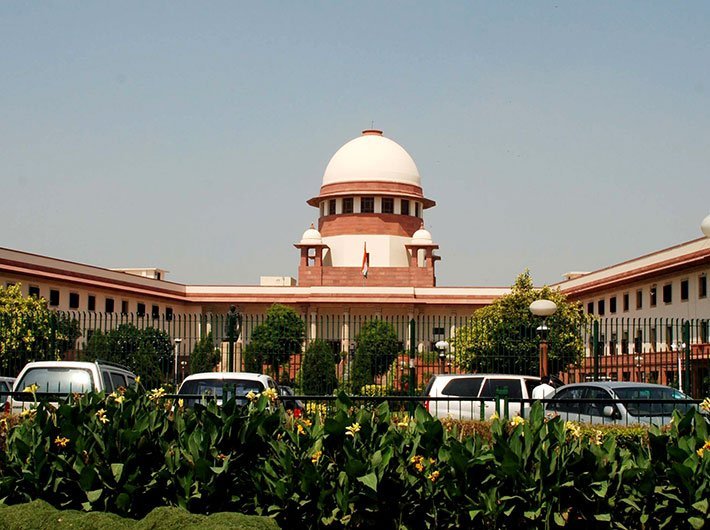SBI told to submit to ECI details of the bonds purchased since the interim order of April 2019
In a landmark judgment, the Supreme Court of India has held the anonymous, unregulated and unlimited funding through electoral bonds and companies as unconstitutional.
The five-judge Constitution Bench of the Supreme Court comprising chief justice DY Chandrachud and justices Sanjiv Khanna, BR Gavai, JB Pardiwala, and Manoj Misra gave the verdict on Thursday, on a petition filed by the Association for Democratic Reforms (ADR).
The court relied on the fact that such a system of political funding which is completely anonymous, unchecked and unlimited goes against the basic principles of citizens’ Right to know under Article 19(1)(a) of the Constitution and free and fair election and therefore the amendments brought through the Finance Act, 2017 and passed as Money bill to Section 29C of RP Act, 1951, Sections 181 & 183(3) of the Companies Act,2013, Section 13A(b) of the Income Tax Act,1961 were struck down as being violative of the Constitution. The court observed the principle that the citizens have a duty to hold the government of the day accountable for their actions and inactions, and they can effectively fulfil this duty only if the government is open and not clothed in secrecy.
The ADR had filed the petition in the Supreme Court on September 4, 2017. Since then, six applications were filed for stay on the purchase of bonds and for early adjudication of the case.
The judgment relied on two key issues:
I. Whether the non-disclosure of information on voluntary contributions to political parties according to the electoral bond scheme and the amendments to Section 29C of Representation of the People Act, Section 183(3) of the Companies Act, Section 13A(b) of the Income Tax Act are violative of the Right to Information under Article 19(1)(a) of the Constitution;
II. Whether unlimited corporate funding to political parties as envisaged by the amendment to Section 182(1) of the Companies Act violates the principles of free and fair elections.
The apex court also asserted that there are already other means other than electoral bonds to achieve the purpose of curbing black money if that was the primary objective of the scheme as per the Union of India’s stand. In its judgment, the court expressed apprehensions such as the scheme's selective anonymity, institutionalised kickbacks for political parties, unequal access to donor information, with the ruling party potentially possessing insight into contributors' identities while opposition parties lack such access. The Apex court while holding information as the key in a participatory democracy for the voters to make an informed choice also emphasized on the concept of open governance and observed;
"100...At a primary level, political contributions give a seat at the table to contributors, i.e., it enhances access to legislators. This access also translates to influence over policy making. There is also a legitimate possibility that financial contributions to a political party would lead to quid pro quo arrangement because of the close nexus between money and politics. The electoral bond scheme and the impugned provisions to the extent that they infringe upon the right to information of the voter by anonymising contributions through electoral bonds are violative of Article 19(1)(a)..."
Following directions were given by the court in the verdict:
I. The issuing bank shall herewith stop the issuance of Electoral Bonds;
II. SBI shall submit details of the Electoral Bonds purchased since the interim order of this Court dated 12 April 2019 till date to the ECI. The details shall include the date of purchase of each Electoral Bond, the name of the purchaser of the bond and the denomination of the Electoral Bond purchased;
III. SBI shall submit the details of political parties which have received contributions through Electoral Bonds since the interim order of this Court dated 12 April 2019 till date to the ECI. SBI must disclose details of each Electoral Bond encashed by political parties which shall include the date of encashment and the denomination of the Electoral Bond;
IV. SBI shall submit the above information to the ECI within three weeks from the date of this judgment, that is, by 6 March 2024;
V. The ECI shall publish the information shared by the SBI on its official website within one week of the receipt of the information, that is, by 13 March 2024; and
VI. Electoral Bonds which are within the validity period of fifteen days but that which have not been encashed by the political party yet shall be returned by the political party or the purchaser depending on who is in possession of the bond to the issuing bank. The issuing bank, upon return of the valid bond, shall refund the amount to the purchaser’s account
ADR welcomes judgment
"We welcome this landmark judgment wholeheartedly. The Supreme Court has given a big boost to Indian Democracy, something our freedom struggle fought for. ADR is privileged to have played a small role in carrying that legacy forward," Prof Trilochan Sastry, chairman, founder member & trustee of ADR, said in a statement.
"It is a very good judgment, which restores the faith of the people in democracy, rule of law, and the Supreme Court of India. It has comprehensively removed the latest mischief in the electoral system introduced in 2017, but we have to remember that the infirmities which existed in the electoral system pre-2017 still have to be worked on. In the euphoria of this judgment, we must not forget or overlook ground reality," said Prof Jagdeep Chhokar, founder member & trustee of ADR.
